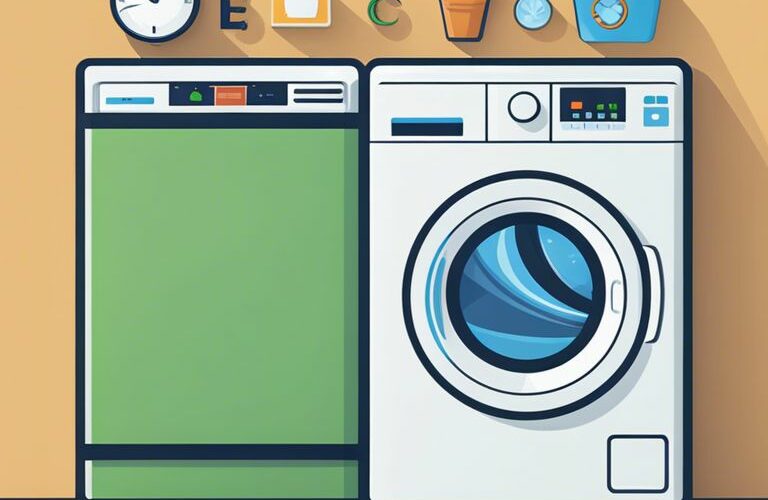Conserving water and energy is not only beneficial for the environment, but it can also help you save money on your utility bills. Using your washing machine efficiently is essential in achieving this goal. Here are 10 smart ways to save water and energy with your washing machine, from adjusting water levels to choosing the right cycle and temperature, to maintaining your machine for optimal performance. By implementing these strategies, you can make a significant impact on both your environmental footprint and your household budget.
Table of Contents
Use Cold Water
Before starting your laundry, consider using cold water instead of hot or warm. This simple switch can have a significant impact on both your water and energy consumption.
Saves energy
To save energy, opt for cold water whenever possible. Cold water does not require the water heater to use energy to heat up the water, which can lead to substantial energy savings over time. Modern washing machines are designed to effectively clean clothes with cold water, so there’s no need to use warm or hot water for most loads. This small change can make a big difference in reducing your household’s overall energy usage.
Protects clothes
On top of saving energy, using cold water also helps to protect your clothes. Cold water is gentler on fabrics and colors, helping to prevent shrinking, fading, and damage that can occur with hot water or warm water. This means your clothes will last longer, reducing the need for replacements and ultimately saving you money in the long run.
Avoiding hot water can also prevent potential damage to delicate items or fabrics, further preserving the quality of your wardrobe.
High-Efficiency Machines
If you’re looking to save water and energy with your washing machine, investing in a high-efficiency machine is a smart choice. These machines are designed to use less water and energy while still delivering excellent cleaning results, making them a more sustainable option for your laundry needs.
Less water use
Water conservation is a top priority for high-efficiency washing machines. These machines use advanced technologies such as sensor controls and efficient water jets to minimize water consumption, allowing you to save on your water bills while reducing your environmental impact.
Energy savings
Less energy use is another benefit of high-efficiency washing machines. These machines are designed to operate at lower temperatures and use shorter wash cycles, resulting in significant energy savings over time. Additionally, many high-efficiency machines are equipped with advanced spin cycles that extract more water from your laundry, reducing drying time and further cutting down on energy usage.
It’s important to note that while high-efficiency machines may come with a higher initial price tag, it’s worth the investment considering the long-term water and energy savings you’ll enjoy. Plus, these machines often come with additional features such as larger capacities and specialized wash cycles, providing you with even more convenience and flexibility when it comes to doing your laundry.
Full Loads Only
Obviously, one of the easiest ways to save water and energy with your washing machine is to make sure you only run it when you have a full load. This means waiting until you have enough dirty laundry to fill the drum, instead of running multiple smaller loads throughout the week. Not only does this save water and energy, but it also helps to prolong the life of your machine.
Water efficiency
Loads that are too small waste both water and energy, as the machine uses the same amount of water and electricity regardless of the size of the load. By waiting for a full load before running your washing machine, you can maximize the efficiency of each cycle and reduce water waste. Consider adjusting the water level settings on your machine to match the size of the load, further minimizing water usage.
Energy conservation
To conserve energy, it is important to only run your washing machine with full loads. Running smaller loads more frequently increases the overall energy consumption of the machine, as it has to work harder to heat the water and agitate the smaller amount of laundry. By waiting for a full load, you can reduce the number of cycles and overall energy usage.
The energy-efficient option available in modern washing machines helps to further optimize energy conservation. Using this feature allows the machine to adjust the water temperature and cycle length based on the size and type of load, resulting in significant energy savings.
Eco-Friendly Detergent
Unlike traditional detergents, eco-friendly detergents are designed to be more environmentally conscious. They are formulated with natural, biodegradable ingredients that are gentler on the planet and your washing machine. Using eco-friendly detergent is a smart choice for reducing your household’s water and energy consumption while still getting your clothes clean.
Less chemicals
With eco-friendly detergents, you can wash your clothes without the use of harsh chemicals that can be harmful to the environment and your skin. These detergents are free from synthetic fragrances, dyes, and other additives that can contribute to water pollution and allergic reactions. By opting for eco-friendly detergents, you are minimizing your ecological footprint and promoting a healthier home environment.
Reduced energy
With eco-friendly detergents, you can also reduce the amount of energy used during the washing process. These detergents are designed to be more easily rinsed out of clothing, requiring less water for the rinsing cycle. This means reduced energy consumption for both washing and drying your clothes, leading to lower utility bills and a lighter impact on the planet.
Plus, many eco-friendly detergents are compatible with energy-efficient washing machines, further reducing your overall energy usage and preserving the lifespan of your appliance.
Adjust Water Levels
Despite the convenience of automatic settings, manually adjusting the water levels on your washing machine can have a significant impact on your water and energy usage. By taking control of the amount of water used for each load, you can save resources and reduce your utility bills.
Matching load size
The most efficient use of water and energy occurs when the load size matches the water level. Overloading the machine with clothes can lead to a inefficient cleaning process as well as increased wear and tear on the machine. On the other hand, underloading the machine results in unnecessary water and energy usage. It is essential to find the right balance to optimize the washing performance while minimizing waste.
Saves water
For a typical washing machine, adjusting the water levels for smaller loads can save a significant amount of water. By reducing the water usage, you are not only conserving a valuable resource, but also lowering your water bills. This small adjustment can have a big impact over time, especially for households that do multiple loads of laundry each week.
With smart adjustments to the water levels, you can effectively limit water waste and save energy by using the appropriate amount of water for each load. By incorporating this practice into your laundry routine, you can contribute to a more sustainable and cost-effective household.
Regular Maintenance
Keep your washing machine running efficiently and effectively by staying on top of regular maintenance. By taking care of your machine, you can ensure it saves water and energy while providing great results with each wash.
Efficient performance
Any issues with your washing machine, such as leaks or strange noises, should be addressed immediately to maintain its efficient performance. Check the hoses, fittings, and connections regularly to prevent any wastage of water during the washing process. Keeping the machine clean, especially the detergent drawer and rubber seal, will also help it perform at its best.
Saves energy
For maximum energy-saving benefits, consider washing clothes in cold water and using the appropriate water level for each load. Regularly cleaning the lint filter and maintaining a balanced load will also help your machine operate more efficiently, resulting in less energy consumption.
Energy-efficient washing machines are designed to save both water and electricity, making them a great investment for your household. By following these maintenance tips, you can ensure your machine continues to operate at optimal levels, saving both water and energy with each use.
Use Spin Cycle
Not utilizing the spin cycle properly can result in wasted energy and water. The spin cycle is designed to remove excess water from your laundry, which helps to reduce drying time and save energy.
Less drying time
One of the smart ways to save water and energy with your washing machine is to make sure you are using the spin cycle effectively. When your laundry comes out of the washer with less water, it will require less drying time in the dryer. This not only saves energy but also helps to prolong the life of your clothing by reducing the exposure to heat from the dryer.
Energy saving
For energy saving, always select the highest spin speed suitable for your laundry. This will remove more water from your clothes, reducing the amount of time and energy needed to dry them. Additionally, using the spin cycle effectively can also help to prevent potential mold or mildew growth in your washing machine, which can consume more energy and resources to clean and maintain.
saving energy, water, spin cycle, drying time, energy
Off-Peak Hours
Now, one smart way to save water and energy with your washing machine is to take advantage of off-peak hours. Many utility companies offer lower energy rates during off-peak hours, making it a more cost-effective time to run your appliances.
Lower energy rates
On top of that, running your washing machine during off-peak hours also helps reduce the load on the energy grid during peak times, which can lower the risk of blackouts and energy shortages.
Furthermore, by shifting the use of your washing machine to off-peak hours, you can contribute to overall energy conservation efforts and support sustainable energy practices.
Saves money
energyBy running your washing machine during off-peak hours, you can save money on your utility bills as energy rates are usually lower during these times.
The potential savings can add up significantly over time, providing a financial incentive to be more mindful of your washing machine usage.
The overall impact of running your washing machine during off-peak hours can extend beyond your household, benefiting the community and the environment in the long run.
Writing Your Own Blog Post is a Premium Feature
Upgrade to save your work, and attract more readers.
Upgrade to Premium
To
Upgrade to Modern
Upgrading to a modern washing machine can significantly save water and energy. Newer models are designed to be more efficient and to use less water and electricity, helping you reduce your carbon footprint while saving on utility bills.
More efficient
More modern washing machines are equipped with advanced technologies, such as sensors and automatic load detection, that allow them to adjust the water and energy usage according to the specific load. They also feature faster spin cycles, which reduce the time needed for drying clothes, ultimately saving energy.
Another important feature of modern washing machines is the option for shorter wash cycles, which can be more convenient and save time and energy, especially for smaller loads.
Saves resources
Saving water and energy also means conserving natural resources and reducing the environmental impact of your laundry routine. By using a modern washing machine, you contribute to the positive effort of conserving water and protecting the environment.
Any household can benefit from the efficiency and resource savings that come with upgrading to a modern washing machine. This is an important step in creating a more sustainable and eco-friendly home.
Conclusion
Conclusively, implementing these 10 smart ways can significantly reduce water and energy consumption with your washing machine, contributing to a more sustainable lifestyle and lower utility bills. By adopting these simple practices, such as adjusting the water level, using cold water, and maintaining the machine, you can actively contribute to conserving water and energy resources. Through these changes, you not only reduce your environmental impact but also save money in the long run. Making conscious choices when using your washing machine is a vital step towards a greener and more efficient household.
FAQ
Q: Why is it important to save water and energy with your washing machine?
A: Conserving water and energy helps reduce environmental impact and lowers utility costs.
Q: How can I save water when using my washing machine?
A: Use the appropriate water level for the size of the load and consider investing in a high-efficiency washing machine.
Q: What temperature setting should I use to save energy?
A: Washing clothes in cold water whenever possible can significantly reduce energy consumption.
Q: Are there specific detergents that can help save water and energy?
A: Yes, using concentrated or eco-friendly detergents can reduce the amount of water needed for rinsing and the energy needed for heating water.
Q: How can I maintain my washing machine to ensure it operates efficiently?
A: Regularly clean the machine to prevent buildup, check for leaks, and ensure proper alignment for optimal performance.

Our contributing author is a passionate advocate for eco-friendly living and sustainability. With a background in eco-life, they are dedicated to inspiring and empowering individuals to adopt environmentally conscious lifestyles. Through insightful articles, they share practical tips, innovative solutions, and thought-provoking perspectives to promote a greener, more sustainable world. Join them on the journey towards eco-smart living and discover how small choices can make a big impact. 🌱








